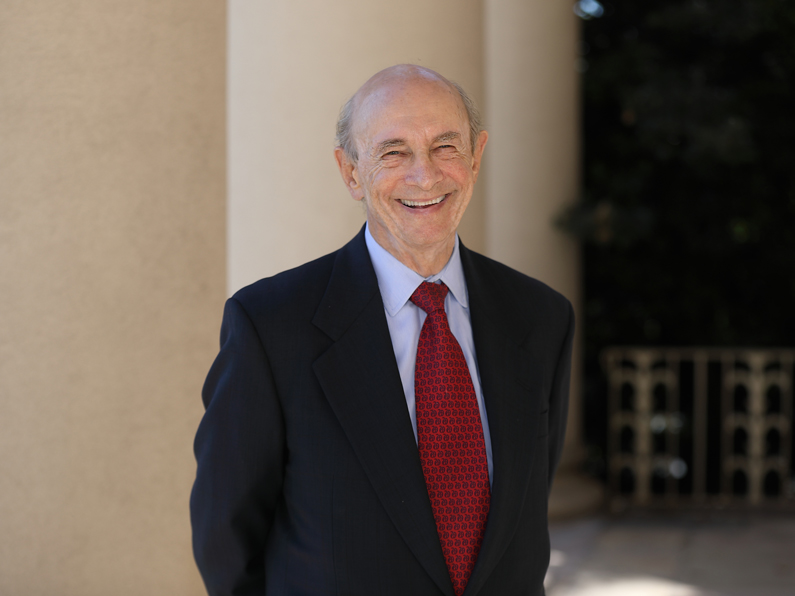Nobel Prize win for Clinical Center scientist
Hepatitis C discovery, blood system safety among accomplishments

It began with an early morning phone call. Instead of a telemarketer or an over-eager candidate jarring him out of bed, the Secretary General of the Nobel Committee in Stockholm, Sweden was on the line informing Dr. Harvey J. Alter he was a co-winner of the 2020 Nobel Prize in Physiology or Medicine for his contributions to the discovery of the hepatitis C virus.
Alter, a Senior Scholar at the NIH Clinical Center's Department of Transfusion Medicine, has worked with NIH for more than 50 years. His research has focused on ways to enhance the safety of the blood supply.
He shares the award with Michael Houghton, Ph.D., from the University of Alberta in Canada, and Charles M. Rice, Ph.D., from Rockefeller University in New York City. The Nobel committee characterized their work as "seminal discoveries that led to the identification of" the Hepatitis C virus.
Hepatitis C can inflame and damage the liver and can cause chronic liver disease, cirrhosis, liver failure, or liver cancer. It is estimated to impact between two to three million Americans.
Alter's work began in the 1960s in the NIH Clinical Center's Blood Bank, studying transfusion‐associated hepatitis. Researchers at the time found that the blood of up to 30% of patients tested positive for hepatitis. They were able to identify some of the infections as either hepatitis A or hepatitis B virus, but there was a persistent component of the blood that indicated another, unidentified, pathogen. They called it "non-A, non-B" hepatitis.
Years of testing and experiments allowed Alter and his colleagues to narrow down the components of the disease.
"[W]e knew that the agent was small and lipid encapsulated, that it was blood transmissible, that it could be transmitted by asymptomatic 'silent' carriers, and that it caused persistent hepatitis in the majority of those infected," wrote Alter in Hepatology in 2013.
While unable to definitely identify "non-A, non-B" hepatitis, the research by Dr. Alter and NIH colleagues led to many advances in blood screening and the reduction of transfusion‐associated hepatitis. By changing the sources and increasing the screening of blood products, the NIH Blood Bank was able reduce the occurrence of the virus into patients who received transfusions.
These new approaches didn't just remain at the Clinical Center. They were assessed in a multicenter, prospective study sponsored by the National Heart, Lung and Blood Institute which demonstrated the power of blood screening in preventing blood-borne infections. Based on this research, screening for hepatitis B was implemented nationally for U.S. blood banks in 1987, saving thousands from debilitating infections.
The "non-A, non-B" hepatitis was later identified as hepatitis C when an assay was developed by co-Nobel winner Michael Houghton.
Hepatitis C testing was introduced for blood‐donor screening in 1990 and had a dramatic effect. Research conducted by Dr. Alter's team found that within three years of implementing the new procedures the incidence of hepatitis had dropped by 75%. After testing improvements, incidents of transfusion‐associated hepatitis soon dropped to virtually zero.
"[T]he risk of HCV transmission is now estimated to be about one case in every two million transfusions," said Alter.
"This is about the same risk as being hit by lightning; personally, I would rather be transfused."
Alter had focused on viral hepatitis even before his work on hepatitis C. In the 1960s, he co-discovered the Australia antigen, a key to detecting hepatitis B virus.
Alter has received many accolades aside from the Nobel prize. In 2013, he was honored with the distinguished Canada Gairdner International Award to recognize outstanding discoveries or contributions to medical science. In 2002, he became the first NIH Clinical Center scientist elected to the National Academy of Sciences, and in that same year he was elected to the Institute of Medicine. And in 2000, Alter was awarded the prestigious Clinical Lasker Award which recognizes people who have made major advances in the understanding, diagnosis, treatment, cure or prevention of disease.
- Donovan Kuehn